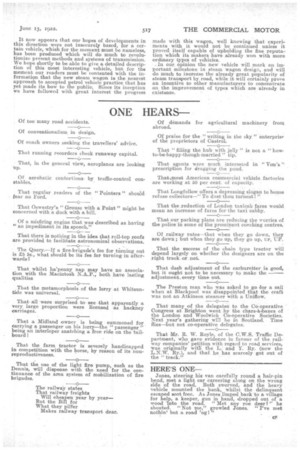ONE HEARS
Page 3

If you've noticed an error in this article please click here to report it so we can fix it.
Of too many road accidents. Of conventionalism in design.
Of coach owners seeking the travellers' advice.
That running recorders check runaway capital.
That, in the general view, aeroplanes are looking up.
Of acrobatic contortions by traffic-control constables.
That regular readers of the " Pointers " shouldfear no Ford.
That 0-swestry's "Grouse with a Point " might be concerned with a duck with a bill.
Of a misfiring engine that was described as having "an impediment in its speech."
That there is nothing in the idea that roll-top roofs are provided to facilitate astronomical observations.
The Query.—If a fire-brigade's fee for turning out is £5 5s., what should be its fee for turning in afterwards?
That whilst ha'penny nap may have no association with the Macintosh N..A.P., both have lasting qualities That the metamorphosis of the lorry at Whitsuntide was universal.
That all were surprised to see that apparently a very. large proportion were licensed as hackney carriages.
That a Midland owner is being summoned for carrying a passenger on his lorry—the " passenger " being an interloper snatching a free ride on the tailboard I That the farm tractor is severely handicapped in competition with the horse, by reason of its nonrepproductiveness.
That the use of the light fire pump, such as the Dennis, will dispense with the need for the continuance of the area system of mobilization of fire brigades.
The railway states That railway freights
Will cheapen year by year—
But the Bill for What they pilfer Makes railway transport dear. Of demands for agricultural machinery from abroad.
Of praise for the " writing in the sky " enterprise of the proprietors of Castrol.
That "filling the hub with jelly" is not a " howto-be-happy-though-married " tip.
That agents were much interested in "Vim's prescription for dragging the pond.
o Thatemost American commercial vehicle factories are working at 50 per cent. of capacity.
That Longfellow offers a depressing slogan to house refuse collectors—" To dust thou turnest I " That the reduction of London taxicab fares would mean an increase of fares for the taxi cabby.
That our parking plans are reducing the worries of the police in some of the prominent cogching centres.
Of railway rates—that when they go down, they are down; but when they go up, they go up, trl', UP.
That the success of the chain type tractor will depend largely On whether the designers are on the right track or . not.
That dash adjustment of the carburetter is good, but it ought not to be necessary to make the -adjustment, every time out.
The Preston man who was asked to go -for a sail when at Blackpool was disappointed that the craft was not an Atkinson steamer with a Uniflow.
That many of the delegates to the Co-operative Congress at Brighton went by the chars-hebanes of the London and Woolwich Co-operative Societies. Next year's gathering will be in Scotland. Time flies—but not co-operative delegates.
That Mr. R. W. Royle, of the C.W.S. Traffic Department, who gave evidence in favour of the railway companies' petition with regard to road services, was originally with the L. and Y. Ry. (now the L.N.W. originally and that he has scarcely got out of
the " track.


































